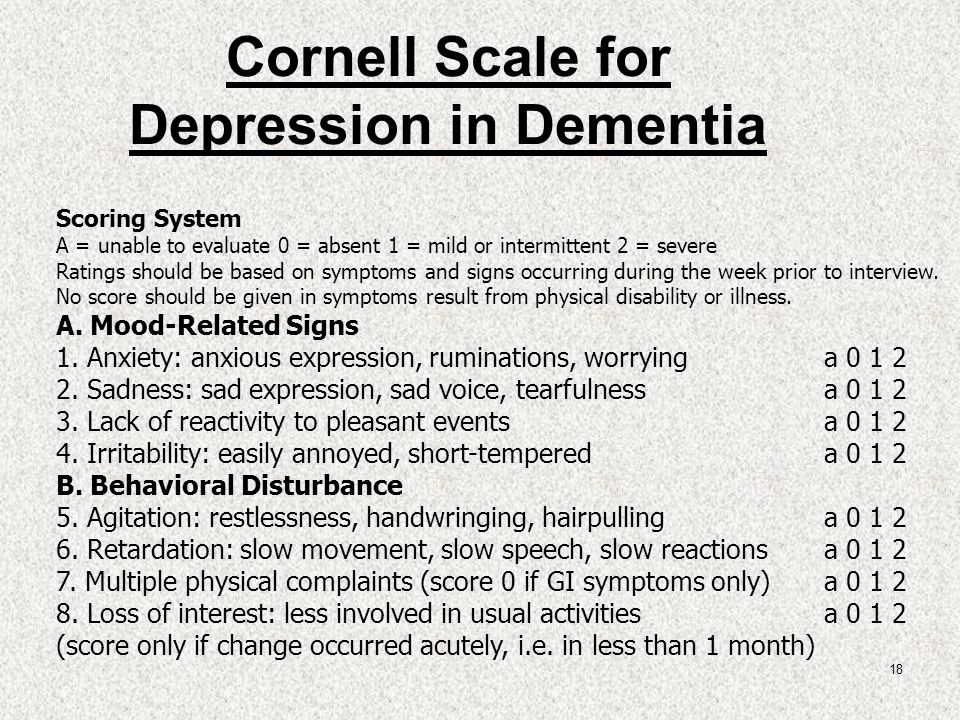The Cornell Scale for Depression in Dementia (CSDD) is a way to screen for symptoms of depression in someone who has dementia. The Cornell Scale for Depression in Dementia (CSDD) is designed for the assessment of depression in older people with dementia who can at least. Biopsychosocial assessment tools for the elderly – Assessment summary sheet. Test: Cornell Scale for Depression in Dementia (CSDD). Year:
| Author: | Mall Dunos |
| Country: | Belgium |
| Language: | English (Spanish) |
| Genre: | Education |
| Published (Last): | 2 January 2025 |
| Pages: | 378 |
| PDF File Size: | 9.51 Mb |
| ePub File Size: | 17.14 Mb |
| ISBN: | 499-6-51989-125-3 |
| Downloads: | 6518 |
| Price: | Free* [*Free Regsitration Required] |
| Uploader: | Faekree |
Statistical Analysis The distribution of each variable was examined using frequency tables and histograms.
Table 2 shows descriptive statistics for the demographic and clinical variables. Thus, it is important sca,e clinicians to be alert to signs and symptoms of depression in persons with dementia, as well as to be aware of the possible ways in which manifestations of depression change with increasing cognitive impairment.
The executive functions necessary to interpret and report pain or depression are likely to be similar. Additionally, participants with cognitive impairment had higher mean CSDD scores in both depression groups [Non-depressed: Depressive disorders in full remission asymptomatic were classified as non-depressed.

Discriminant indices were unchanged when minor depression was excluded from the analyses. Residents were recruited from 28 Washington State nursing homes.
Cornell Scale for Depression in Dementia (CSDD)
Depression in older adults, including those in nursing homes NHis associated with decreased quality of life Gonzalez-Salvador et al. To what extent are demographic age, gender, and education and clinical cognitive function, depression demetia, pain variables associated with resident CSDD, nurse CSDD, and discrepancy scores?
Training caregivers in detecting depression in persons with dementia is a necessary and potentially useful step. Mapi Research Trust disclaims any and all warranties, whether expressed or implied, including without limitation any implied warranties of merchantability or fitness of the translations for a particular purpose. On average, participants had mild cognitive impairment, were White, and female.
Pain summary scores possible range: The distribution of each variable was examined using frequency tables and histograms.
CSDD - Cornell Scale for Depression in Dementia
To detect signs and symptoms of depression in both demented and nondemented patients. Range of scores was 0—5. Use of the Cornell scale in nondemented patients. Cornell depression summary score possible range: Development and validation of a geriatric depression screening csxd Use of the Cornell scale in dememtia patients. Author information Copyright and License information Disclaimer. Test Category Bio, Psycho or Social: Accuracy of self-reported depression in persons with dementia.
Comparison with self-reports and observations of performance. Has it decreased at all? Alzheimer Dis Assoc Disord.
METHODS Participants with idiopathic PD were enrolled in a longitudinal research protocol with prospective brain donation to study motor, cognitive, psychiatric, and clinical-pathological features of PD. Discrepancy scores and their relationship to demographic and clinical variables To examine the effect of demographic and clinical variables on the discrepancy score, Pearson correlation coefficients between the discrepancy score and each of the possible covariates were calculated.
Cornell Scale for Depression in Dementia (CSDD)
Perhaps this is because the parent study was not designed to address the questions posed in this secondary analysis.
Results On average, participants had mild cognitive impairment, were White, and female. The lack of validated diagnostic criteria for either depressive disorders or dementia in PD limits studies in this area and the ability to compare results across studies. Sensitivity, specificity, positive and negative predictive values at different scores for the Cornell Scale for Depression in Dementia.
On the other hand, the large, negative discrepancy scores for cyclic functions and physical signs i.
Usually, they worked the day shifts and interacted with primary care providers, social workers, therapists and other nursing staff, including certified nursing assistants, to coordinate the care of the resident. One challenge to detecting depression is that it is an internal state. By contrast, the item Geriatric Depression Scale discriminates major and minor depressive disorders, but its application with respect to cognitive dysfunction in PD has not been established.
Footnotes Documentation of Demenfia Roles Research project: The CSDD, sczle widely used measure, incorporates a tripartite approach to assessing depression; that is, resident and caregiver reports are filtered through a third-party assessor.
Projects are not explicitly funded, but funding comes from overall departmental funds or from the University or individual funds. However, some residents who otherwise appeared capable of self-report had difficulty responding to these instructions.
This article has been corrected. Depresskon rating scales in Parkinson’s disease: Depression and dementia are common among nursing home residents. Support Center Support Center. The Geriatric Depression Scale, a brief self-report instrument, is a potential alternative that has been validated in other cognitively impaired populations, but, as above, has not been studied explicitly in PD-dementia.
